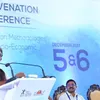[Funding alert] IoT-based water management startup WeGot raises $2M in seed round
With this funding, WEGoT aims to implement a sustainable water management solution across a million homes and save 10 billion liters of water in the next two years.
IoT-based startup WEGoT on Wednesday said it has closed $2 million as part of its seed funding, led by GoFrugal, Shyam Shekar (Founder of iThought), and Brigade Enterprises Ltd.
Other investors who participated in this round include Vibhu Natarajan, Director at Grotech Landscapes, Rajagopal S from Entrust, Joydeep Ponugoti from Manbhum Constructions, and Promod Kumar who are industry experts in the real estate technology and consumer industries.

The capital infused will be used predominantly to strengthen its IoT enabled product portfolio, scale its presence in India, as well as to expand its team and double its employee base over the next six months. The company also plans to use the capital for R&D as well as boost its sales and marketing functions.
Chennai-headquartered WEGoT Utility Solutions was founded in 2015, and offers integrated water management solutions in real-time to prevent and address the water crisis.
WEGoT claims that its sensor-based Internet of Things (IoT) device and software platform VenAqua helps to reduce the demand for water by more than 50 percent by tracking real time flow.
The granular data collected from various installations across residential and commercial buildings are analysed, and the insights are shared with the end-users on a mobile app. As part of the process, people become more accountable and decrease their consumption by making real-time decisions.
Vijay Krishna, CEO and Co-founder of WEGoT, said,
“India is gradually beginning to realise the importance of water and how to use it smartly. Traditional water meters detect air passing through pipes that causes errors in reading. In addition, leakages, abnormal usages, and open taps are not detected by traditional water meters. WEGoT’s R&D team has solved this and has developed a high precision smart water meter that can provide data, which is of interest to multiple stakeholders: utilities, homeowners, insurance companies, maintenance providers, facility managers, government organizations, research foundations."
The startup’s solution is subscription based, wherein the company gives the product for free, and users pay a nominal monthly fee of Rs 149 (for a residential setup) or 20 paise per square feet (for a commercial setup) apart from installation charges.
WEGoT's lead investor Kumar Vembu, Co-founder of GoFrugal, added,
“A recent water report states that 21 of the metro cities will run out of water by 2020, and majority of the Indian water resources will run dry by 2030. Given that residential usage accounts for a large portion of India's water consumption, water is one luxury that needs to be conserved efficiently. We need a technology that will make people liable for misuse of water. WEGoT is addressing exactly this issue and we are very confident that their breakthrough technology will disrupt the way we perceive this vital resource.”
At present, WEGoT has over 60 employees, and services over 25 thousand homes across India, managing water in commercial properties spanning 20 million square feet.
While, Nirupa Shankar, Founder, Brigade’s Real Estate Accelarator Programme, said,
“According to the Composite Water Management Index (CWMI) report by Niti Aayog, the ongoing water crisis will severely affect India’s realty sector, even threatening developers working on major projects. So, commercial buildings today need to be adapted to a rapidly transforming landscape. Incorporating data-driven efficiencies in water management solutions holds great promise in the commercial real estate sector, and we strongly believe WEGoT is positioned to disrupt this space.”
WEGoT aims to implement sustainable water management solution across a million homes and save 10 billion liters of water in next two years.
(Edited by Megha Reddy)


![[Funding alert] IoT-based water management startup WeGot raises $2M in seed round](https://images.yourstory.com/cs/2/bd251c602d6a11e9aa979329348d4c3e/8c65c3959c8335ee365469af3d2820b21571211825922jpg?mode=crop&crop=faces&ar=2%3A1&format=auto&w=1920&q=75)






